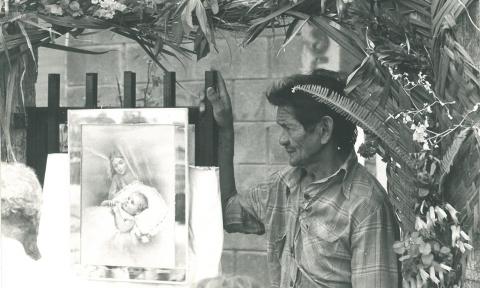
“The Lord is my Shepherd, I shall not want. He makes me lie down in green pastures, he leads me beside the still waters, he restores my soul….” Who among us is not touched by the beautiful images of Psalm 23? The image of Jesus as the Good Shepherd watching over us, guiding us and restoring our weary souls has sustained generations of Christians. In the reading from the Gospel of John today, the metaphor is turned slightly, to see Jesus not just as the compassionate shepherd to his followers, but at the very gate through which we arrive at the pastures of New Life. Recognizing that there are a plenty of wolves about – and thieves and bandits as well – Jesus reassures us that “I am the good shepherd… I came that they may have life, and have it abundantly.”
Like all scripture, this passage from John and the wonderful verses of Psalm 23 take on different meaning to us at different moments in our lives. As a child growing up in small-town U.S. in the 1960s, I heard this Good News from an innocent and pretty individualistic perspective: Jesus was my good shepherd who was watching over me, and everything would be OK, even when deep down I knew that it wasn’t. I believed that I could “fear no evil” because Jesus was watching over me as my personal Lord and Savior.
Years later I would remember that innocent image through bitter tears as I witnessed such evil that made me doubt that God existed, not to mention scoff at the idea of Jesus watching over us. As a Maryknoll lay missioner I was working with a small Christian community in an urban barrio in Venezuela that suffered tremendous violence at the hands of corrupt police and soldiers. Our church human rights group had been asked to accompany the families of the desaparecidos – hundreds of residents of Caracas’ slums who had been killed and “made to disappear” in secret mass graves in revenge for mass protests by the poor against the government. We had found a mass grave on an abandoned hillside on the edge of the city, with 108 persons thrown into it, their bodies in black plastic bags.
Our community took turns camped out beside the mass grave for the months it took to identify the bodies and move our case against the government through the courts. We felt amazed horror for the persons who could do such evil to innocent people living on the margins of society. At the same time the camaraderie and kindness of the communities camped out there, and their deep faith amazed me even more. We cried together, but we also laughed together. And most of all, those mothers of the disappeared had hope: hope in Jesus … the good shepherd.
I remember driving back to our barrio from one of the weekends camped out with the families by the grave. It had been a particularly rough three days because of the exhumations of bodies and the emotional reactions of the victims’ families. Before we entered our neighborhood, I pulled our truck to the side of the road and suggested to my companions that we pray and reflect together on what we’d just been through, before we reentered our barrio and returned to our lives of work and school and families. We knew it was an experience that would mark each of us for the rest of our lives, and as we shared about it, it became clear to us that we probably would never completely understand why such violence, such evil could happen.
After a long time our reflections turned to prayer and our prayers turned to forgiveness. One of the college students in our group, Alì, prayed: “Jesus forgive those men who did this, forgive the killers who could dump our brothers and sisters like garbage in trash bags in the ground. We are not garbage. We are children of God, just as they are. Jesus, help us to forgive them. And help them to see that we are all children of God.”
In that moment, for me, the gospel message of Jesus promising “that they may have life, and have it abundantly” took a new meaning, however hesitant, and admittedly still in shock: “The Good Shepherd” doesn’t watch over us and protect us from all harm like some fairy godmother. He offers us New Life as a community that struggles together, suffers together and ultimately celebrates new life together in spite of the death and evil that confronts us. Together we must find the still waters; together we must find and protect the green pastures. It’s not about Jesus looking after me, or you, while 10,000 children have been killed in Syria since the start of the civil war there. He’s not my personal savior in spite of the fact that I ignore the U.S. policies that leave thousands of children trapped in Gaza without clean water and sufficient food or medical care.
We hear the words of today’s Gospel and the beautiful verses of Psalm 23 as a community, not as individuals. We are called to respond, as well, as a community to the injustices and evil – “the wolves” - that threaten the green pastures of the good shepherd. If we do, I believe that we will find that he has restored our souls and led us among the still waters.
